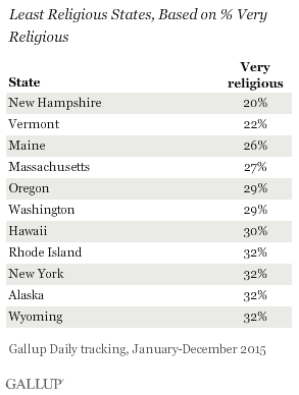Although Republican presidential candidate Donald Trump is expected to win the New Hampshire GOP primary Tuesday, Americans view him as the least religious candidate. Some voters feel this connection is no coincidence, given that New Hampshire is often considered America's least religious state. Additionally, the democratic candidate leading the polls so far in the state is Bernie Sanders, a candidate who publicly admits he does not participate in organized religion.
Only one out of every five people in New Hampshire described themselves as "very religious" in a 2015 Gallup poll, which defined the term as people "who say religion is important to them and who attend services every week or almost every week."
New Hampshire was the least religious state in the United States, edging out Vermont in Gallup's 2015 state-by-state analysis.

Trump is leading New Hampshire polls with 35 percent of support among New Hampshire Republican voters, compared to Ted Cruz's 13 percent, which follows Cruz's win in the Feb. 1 Iowa caucuses, reports Vocativ.
Only 30 percent of Americans say they consider Trump either "very" or "somewhat" religious, according to the Pew Research Center, which polled Democrat and Republican American adults from Jan. 7 to 14. That's even less than Sanders, who has said he's not "actively involved with organized religion."
A total of 40 percent of Americans polled by Pew stated they thought Sanders was "very" or "somewhat" religious. Cruz, on the other hand, was considered "very" or "somewhat" religious by 65 percent of polled Americans.
State-by-state results for the Gallup poll were based on 174,000-plus interviews conducted as part of Gallup Daily tracking in 2015, including more than 480 interviews in every state and more than 1,000 interviews in most states.
Gallup classifies Americans into three religious groups based on their responses to a question measuring religious service attendance and how important religion is in their daily life. Very religious Americans are those who say religion is important to them and who attend services every week or almost every week. Nonreligious Americans are those for whom religion is not important and who seldom or never attend religious services. Moderately religious Americans meet just one of the criteria, either saying religion is important or that they attend services almost every week or more.
Gallup began tracking several religious indicators on a daily basis in 2008. Some of these indicators have shown significant change over this time, most notably the percentage of Americans who report no formal religious identity when asked to name their religious preference.







